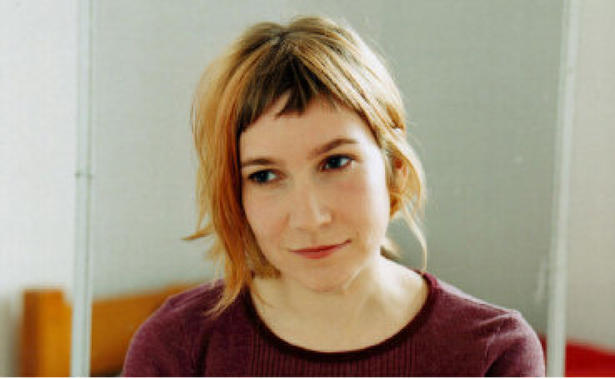ToBS R3: “Everybody Has a Story” (1) v. Literary Marriage (5)
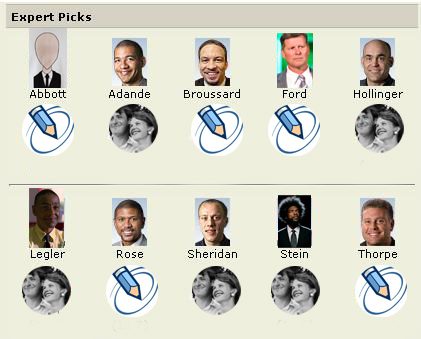
[matchup #55 in Tournament of Bookshit]
Midwest Round of 16, Sprint Center, Kansas City, Missouri
After a mathematically efficient run through the opening weekend of the tournament, “Everybody Has a Story”, the First Day of Your Undergraduate Intro to Creative Writing Course Skyriver Conference Champion, faces off against perennial underachiever Literary Marriage, an at-large team from the Contributor’s Note America-12 Conference in what promises to be a contrast in styles. “Everybody Has a Story,” the number-one seed in the Midwest Bracket and Bookshit Final Four mainstay got to Omaha with a tactical waxing of “Show Don’t Tell” in the opening round of the tournament, followed by their devastating disposal of “Following 1000s on Twitter”, whom despite their up tempo “40 Minutes of Hell” defense were eventually overwhelmed by the methodical pace of “Everybody Has a Story”. Literary Marriage, on the other hand, squeaked out a dramatic win against potential bracket buster Child of Famous Author’s Novel in the 5 vs. 12 matchup in the opening round followed by a hard fought victory over favored NaNoWriMo, who had a large early lead in that game but eventually ran out of steam, which led to an awkward finish in which NaNoWriMo (#12 in the AP poll) publically celebrated their victory on various social networking platforms despite falling short by at least 13,000 points. READ MORE >
ToBS R3: Celebrity Fiction vs. Short-Shorts Referring to Whiskey Consumption

[matchup #52 in Tournament of Bookshit]
The main thing about celebrity fiction is that it seems unfair. Writers are writing to get famous. If we had some other way of getting famous, we would probably being doing that, right? But most of us don’t have any other real choices, in the getting-famous-category. Most of us are bad at sports and can’t sing well and don’t have, you know, like personalities and shit. Most of us enjoy sitting in rooms by ourselves and making stuff up about people who don’t exist. If that’s what you spend your time doing, writing is pretty much your only shot, in terms of famous.
But already-famous people who write, what are they doing? Trying to get respect? The fuck is respect going to get you that being famous doesn’t? Maybe you feel a little better about yourself, being respected? Can you buy a sandwich, with that feeling-a-little-better-about-yourself? Can you pay rent with that? READ MORE >
ToBS R2: Facebook-based political ‘activism’ vs. litblogging at age 35
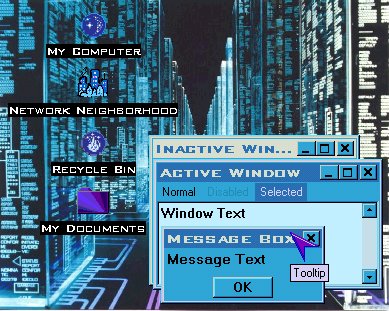
[The tournament is back on! It will be decided before the 1 year anniversary of the tournament!– ed.]
[matchup #48 in Tournament of Bookshit]
i’m not on facebook, cause i guess i’m like THAT GUY or whatever, so what happened is that my gf gave me her login info so that i could browse it and be able to accurately judge this battle but all i did was look at her emails and private messages, and, like, pictures of dudes who comment on her pictures and also i looked at pictures of attractive women who seemed to show up a lot in general. but right now i can’t think of a single thing worse than facebook-based political ‘activism’ such as the bunch of posts i couldn’t help seeing that attempted to ‘deal with the problem’ of animal suffering and eating meat re thanksgiving and veganism. i maybe half respected the lady on the street who yelled “make the leap, go vegan!” at me as i passed but what i did on thanksgiving was sneak downstairs late after dinner and eat cold turkey by the light of the refrigerator, thinking of her. do i even have to mention ows here or can i just ignore it the same way everyone ignored the local elections last month? READ MORE >
Why Do we Like Marie Calloway?
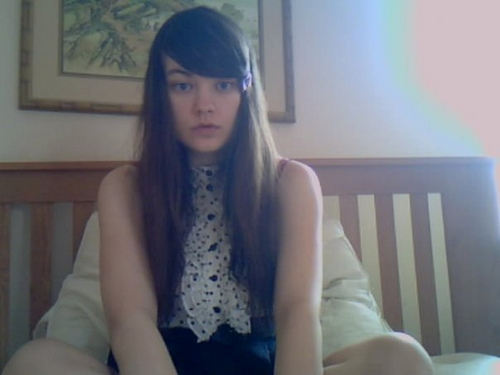
This is a good question to ask because: she has written only four stories and has appeared on Vice and has had requests from agents to represent her. Even though many writers in the online literary world, such as Elizabeth Ellen or Sam Pink have been writing for years before good things started to happen. And I don’t know if either of them even have agents.
So what is about Marie Calloway’s stories that make them so desired? Why would an agent assume she could write a book that would sell 100s of thousands?
To use Occam’s Razor to get to the simplest explanation, which I think explains the agent: is that Marie Calloway’s writing is about a young girl having sex. Which people love. Men love imagining a young woman having sex and young women want to read about other young women having sex. The writing is sensational, she uses famous people’s names, a young woman/girl has sex, she goes to fabulous cities like New York City or London. She mentions porn’s influence on male sexual behavior. She has sex with an older slightly famous writer who is married. She loses her virginity before marriage, has promiscuous sex. She is topical, she is sexual. She is Star/Enquirer magazine/Harlequin mixed with alt-lit.
Pop Serial No. 3 Contributor Quiz
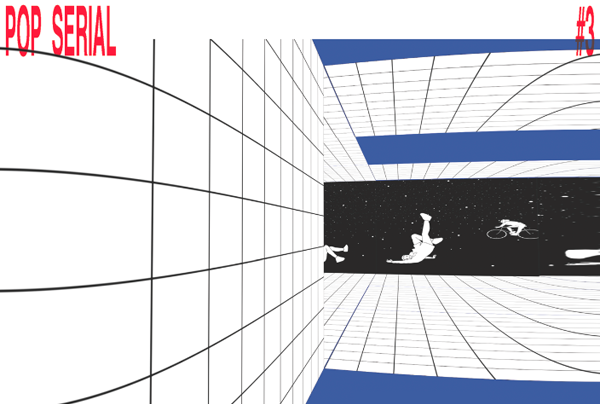
Hi. Stephen Tully Dierks here. The third issue of Pop Serial is being serialized online here. A print edition is forthcoming. The magazine also has a regularly updated tumblr with news and things concerning past, present, and maybe future contributors.
The third issue features writing and/or visual art by the following people: Tao Lin, Luna Miguel, Ben Brooks, Sam Pink, Steve Roggenbuck, Blaise Larmee, Frank Hinton, Timothy Willis Sanders, Richard Chiem, Ana Carrete, Crispin Best, Poncho Peligroso, Andrew James Weatherhead, Cameron Pierce, Shaun Gannon, Michael Inscoe, Cassandra Troyan, DJ Berndt, Madison Langston, Zachary Whalen, Liam Bjartrun Adams, Spencer Madsen, Elaine Sun, Jackson Nieuwland, Omar De Col, Stacey Teague, Meggie Green, James Duncan, Cassandra Nguyen, Marshall Mallicoat.
To celebrate, I asked random questions to friends of mine who were on gchat at the time. Omar De Col and I came up with some questions while intoxicated. I gave each person a choice of question. The vague topics/subjects from which to pick were: bloodthirsty Lappet-faced vultures; otters; poop; Omar De Col; fish butt-rape. Some people picked the same question as each other. Fish butt-rape was the most popular question. Below are the questions and responses.
Unfold is the wrong word: An Interview with Bhanu Kapil
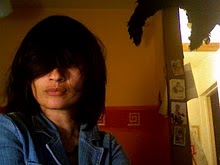
To read Bhanu Kapil‘s work is to witness it taking shape. It is as if she writes just for us, closing the space between reader and writer. That space, whose medium is the page, is cared for as one cares for a body. It takes on a consciousness. We feel comfortable, cared for, led calmly to scenes beautiful and horrific, and we trust her to be our guide. Kapil’s work is not something the reader can passively consume, it is something of which you are a part. Her novels move poetically; they are fragmented but do not surrender a narrative. She doesn’t just show us that we are looking through a window, she opens it and decorates it by setting photographs on the sill along with flowers, quotes, cups of tea and coffee; she paints it orange and red and yellow and green; she lets the outside world spill in: wind, leaves, mud, shouts of wolf-girls playing in libraries, and conversations between immigrants and cyborgs. Her narrators are liminal and migratory and her worlds strange, unstable, and yet familiar.
Bhanu Kapil is the author of four full-length works of prose/poetry: The Vertical Interrogation of Strangers (Kelsey Street Press, 2001), Incubation: a space of monsters (Leon Works, 2006), humanimal [a project for future children] (Kelsey Street Press, 2009), and Schizophrene (Nightboat Books, 2011). This summer, she is teaching a workshop at the intersection of performance and the novel at Naropa University’s Summer Writing Program. During the year, she teaches full-time at Naropa’s Jack Kerouac School of Disembodied Poetics in Boulder, Colorado, and part-time for Goddard College in Plainfield,Vermont. She also maintains a part-time practice as an integrative bodyworker, focusing on Ayurvedic treatments. Born in the UK to Indian parents, Bhanu, “dreams of turning into a female Michael Ondaatje, writing proper novels in her garage, which has been converted into a solar-heated hut. If that doesn’t work out, she will continue to write anti-colonial literatures and pioneer new spa treatments. Currently, she is working on a paste of chickpea flour, turmeric and rose petals that is guaranteed to brighten even the most winter-bound skin.” For many years, she blogged at WAS JACK KEROUAC A PUNJABI but then, abruptly, stopped.
The interview with conducted through email. READ MORE >
Pseudonyms, Authenticity, and Internet Identity
When I was a kid I made up a superhero named Dr. Power. He wore a blue costume, carried a purple Frisbee not unlike Captain America’s shield, and whatever powers he possessed were derivative of whatever comic books I’d been reading at the time.
Drawing Dr. Power wasn’t enough. I wanted to be him. My mom encouraged my eight-year-old fantasy by making me a handsome cape out of blue velvet, and I made my own mask out of paper-mache. The mask sucked, it was thick and heavy and weird-smelling, and I could barely see anything out of the eye holes, but I thought it looked pretty cool.
For some reason it was important that my friends believed Dr. Power was real, and not just my super alter ego. So I had my brother take a picture of me standing next to Dr. Power while Dr. Power did pull-ups in our bedroom doorway. See, that’s the best you could get with Dr. Power, because he didn’t have time for photo shoots. He had to stay fit. Eveready. You never know when your next deranged enemy will come busting through the wall.
Gay Sunshine, 1971

I remember the first time I thought a guy was hot. It was an ad in The Saturday Evening Post, a really American magazine and there he was, tall and blonde with his suit jacket slung over his shoulder like Sinatra and he was says into the camera Hey Mom and Dad can I have $20,000 for college. And that seemed like an enormous amount of money at that time and I knew my family wasn’t going to help me do anything like that – especially since I was considered dumb but I tore the page out of the post and stuck it on my wall. I figured it would appear to be about my absurd dreams of going to college but I knew it was about that guy. And my brother knew as well. My brother was a chubby guy named Edward who lived across the hall. I’ve met Edward Field since then who is a poet and he has made the name okay but in my family both my fat brother and that sadistic bastard uncle Ed both marked the name as anything but good. I mean I don’t know why I hate my brother so much since he was my first lover if I may be so perverse. I guess it’s because despite his devotion to sucking my cock when we were kids he didn’t actually want to be perverted. He wanted to be dad which he is today but I remember what his glee looked like when disgustingly for the first time I got off. He would come into my bedroom in the morning and I would pretend. Pretending seemed to be what befitted the baby brother. I was ten when our game began. First he’d play with my nipples which made me both crazy and sick because I thought he wouldn’t do this if we had any sisters so he’s making me like a girl but that’s when my boner would begin so I knew I was sick too. Kind of like him. But the look on his face when he took my tiny cock in his mouth was really bad like he was eating bad food. It was just like he was ashamed by what a pervert he was and of course the fact that he made himself sick was what made it okay for me. To be quiet, to softly groan, to put the pillow over my mouth so I wouldn’t make noise and mom wouldn’t come up and afterwards I got paid. He’d throw seventy-five cents on my bed or sometimes only fifty like we were in some western but in the movies cause on teevee they never went that far. Sometimes we went really far. It seemed to me at the time. If Mom went shopping on Saturday morning he’d be right there in my room and he’d be sniffing my asshole and licking it like a dog and once in a while shoving a finger in with the help of some Vaseline. READ MORE >
Architectures of Possibility: An Interview with Lance Olsen
Lance Olsen is the author of more than 20 books of and about innovative fiction. He acts as Chair of the Board of Directors for the Fiction Collective 2 and teaches experimental narrative theory and practice at the University of Utah. What follows is a conversation with him about his newest book, Architectures of Possibility: After Innovative Writing.
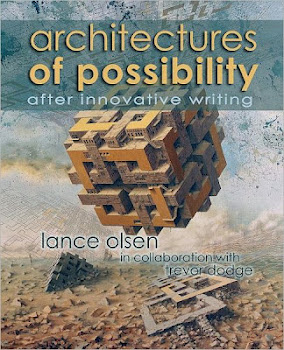
Q: Would you talk a bit about the book in relation to its title? Why the words “architectures” and “possibility”? What about the phrase “after innovative writing?” Are we now in a post-innovative literary world?
A: Let me take your last two questions first, and argue that the history of writing (think Petronius’ Satyricon, Sterne’s Tristram Shandy, Joyce’s Ulysses) has been, not one of dogging conventions, but of continuously undoing them, experimenting with and beyond them, continuously redefining them, exploring the boundaries of the writerly act, of how we might tell our narratives—and hence ourselves, our worlds—differently. So-called conventional acts of writing, then, are the uninteresting detritus of literary history. Innovation is where literary history takes place.
If that’s the case, then contemporary experimentalists are not only continuously in pursuit of the innovative, but are also always-already writing subsequent to it—writing, that is, in its long wake. Hence my pun in the title on the word after.
And so to your initial question: for me, innovative writing represents a possibility space where everything can and should be attempted, challenged, thought, where every architecture should be explored. In other words, we’re talking about the ideology of form here. Another way of saying this: meaning suggests meaning, but structure suggests meaning as well. To structure one way rather than another is to convey, not simply aesthetic preference, a matter of taste, but a course of thinking, a way of being in the world, that privileges one approach to “reality” over another. One of the jobs of the innovative is unceasingly to challenge the dominant cultures’ narrativization of “reality,” to remind us that there are always other ways to construct the text of our texts, the texts of our lives, always the possibility of effecting change in both.
To write within the innovative, then, is much more than a creative choice. It’s an ethical imperative.

